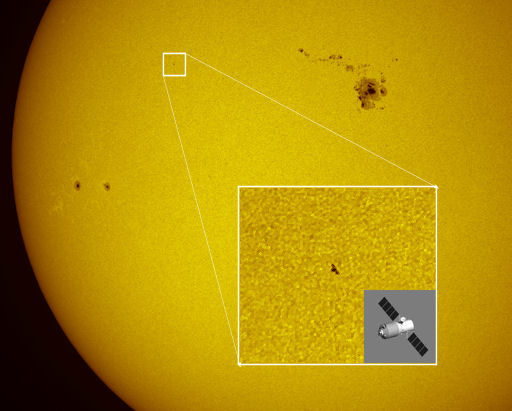Chinese space station transits the sun (Thierry Legault photo)
http://spaceweather.com/
CHINESE SPACE STATION TRANSITS THE SUN: Solar photographers have grown accustomed to winged spaceships flying in front of the sun. For years, silhouettes of space shuttles and the International Space Station have flitted across the solar disk, producing photo-opsofrarebeauty. Now China's space station, the Tiangong-1 ("Heavenly Palace 1"

, is joining the show. On May 11th, perhaps for the first time, Thierry Legault of Paris, France, caught the newcomer transiting the sun:

"Orbiting Earth at 16,500 mph, the Chinese station flitted across the sun in only 0.9s," says Legault, who captured the split-second transit using a solar-filtered Takahashi FSQ-106 refractor and a Canon 5D Mark II digital camera.
At the moment, the silhouette of the 19,000 pound Tiangong-1 is dwarfed by its older cousin, the 990,000 pound ISS. Tiangong-1 will grow a little larger in the summer of 2012 when the Shenzhou 9 spacecraft docks with it. Chinese astronauts will be on board for their first visit to the outpost. The Chinese space agency says this is just the first step toward the development of a much larger space station planned for launch in 2020. Stay tuned for more--and bigger--silhouettes.
You can see Tiangong-1 in the night sky with the naked eye. It can be as bright as a 1st-magnitude star. Check your smartphone or SpaceWeather's Simple Satellite Tracker for sighting opportunities.
Full image at
http://legault.perso.sfr.fr/transit_tiangong1_120511.html
